Intel Core i9-13900K and i5-13600K Review: Raptor Lake Brings More Bite
by Gavin Bonshor on October 20, 2022 9:00 AM ESTGaming Performance: 1440p
In our Ryzen 7000 series review, we saw users commenting about testing games for CPU reviews at 1440p, so we have duly obliged here. Those interested in 1440p performance with minimal image quality – particularly the esports crowd – will be glad to know that we will be testing at this resolution going forward into 2023 and beyond.
Civilization VI
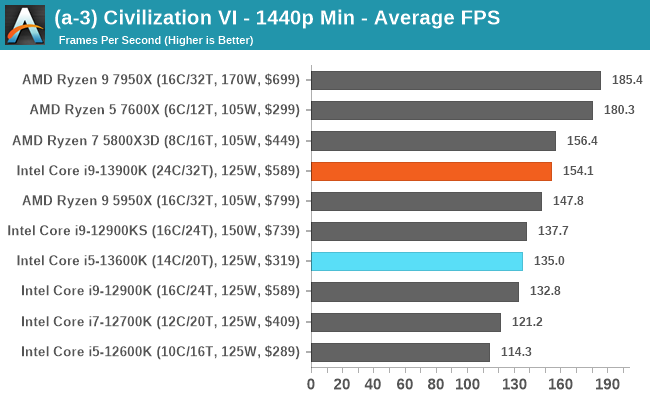
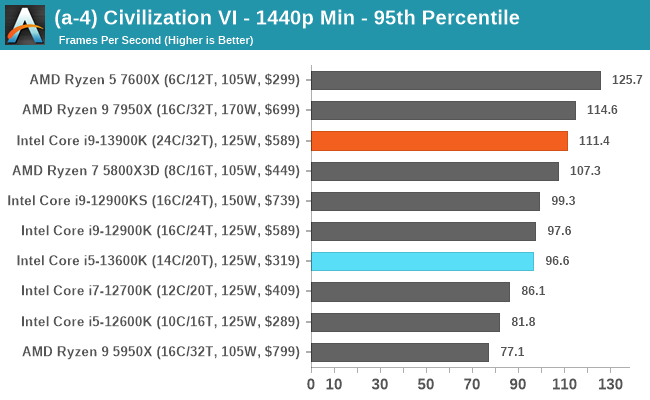
Borderlands 3
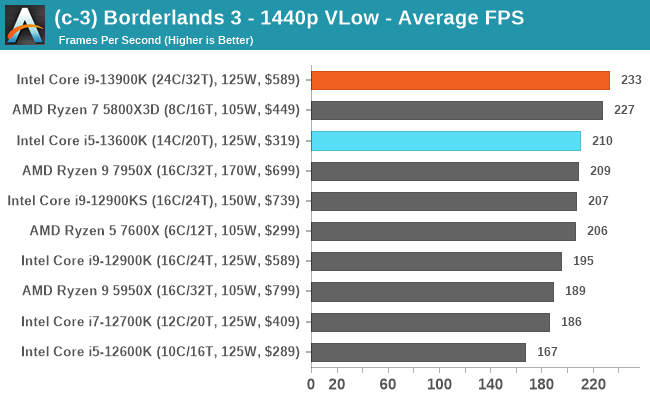
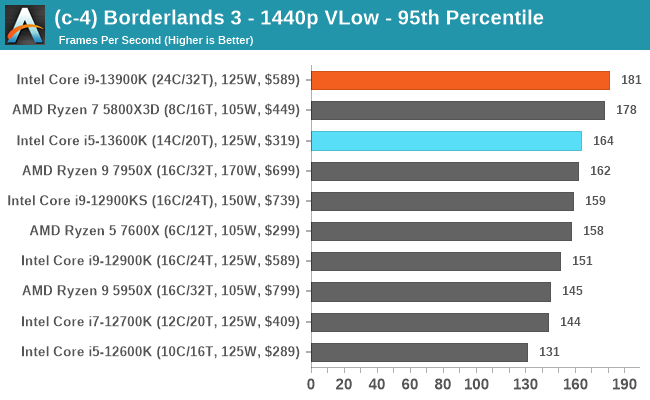
Grand Theft Auto V
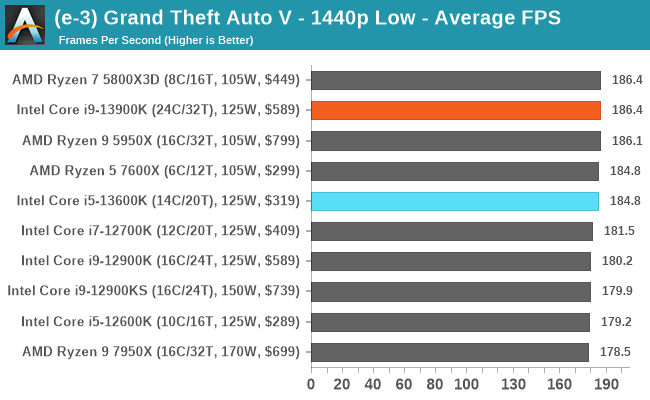
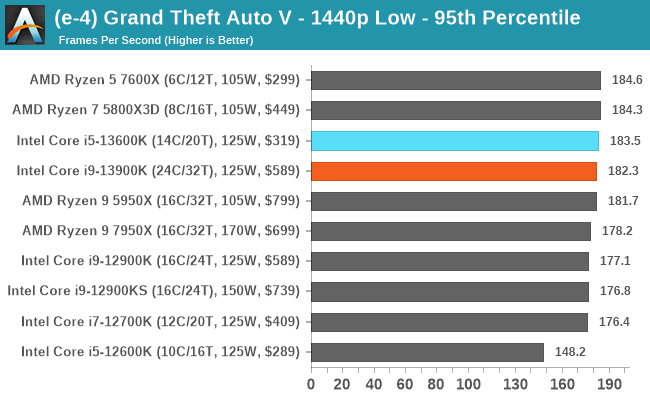
Red Dead Redemption 2
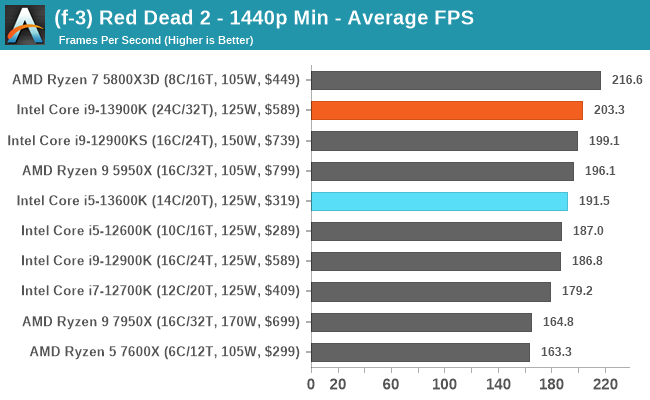
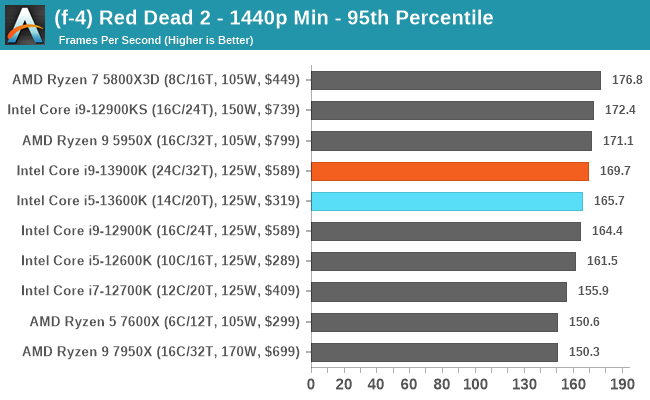
F1 2022
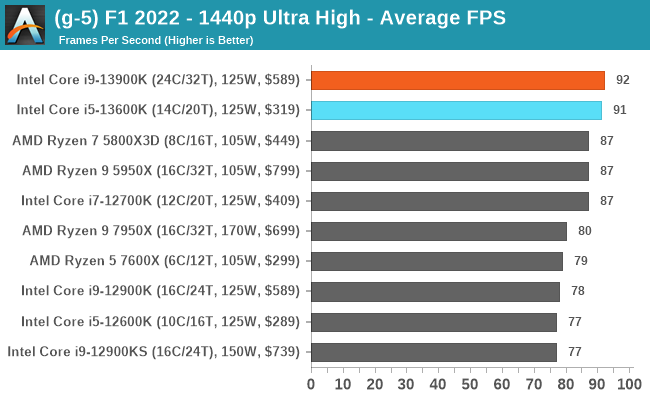
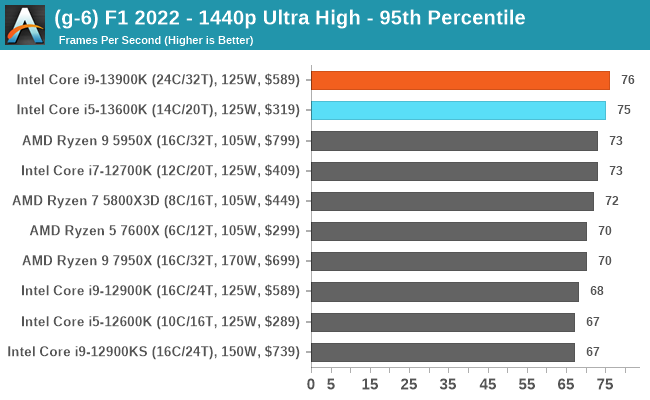
Hitman 3
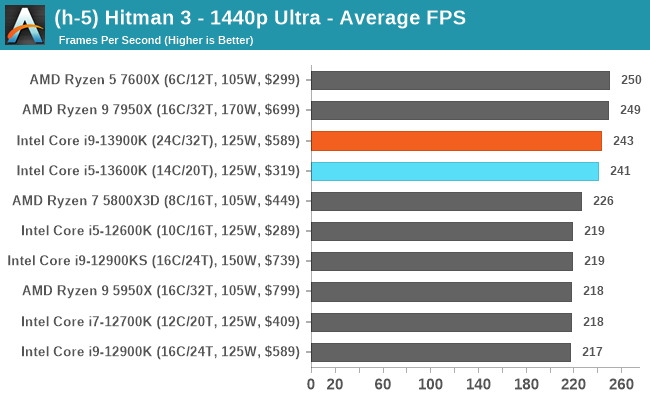
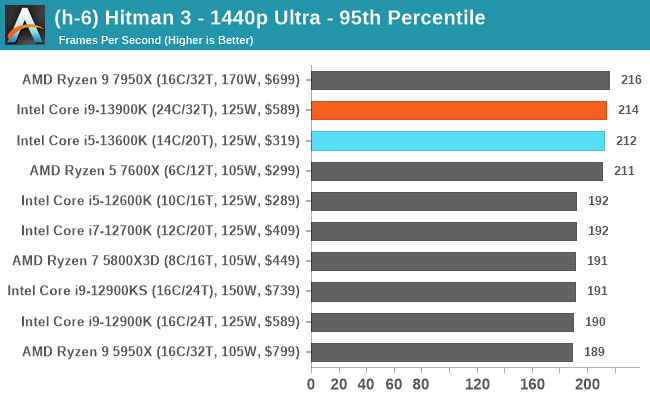
Total War: Warhammer 3
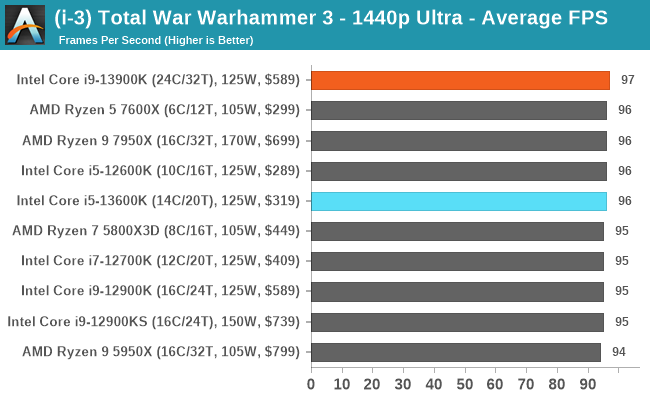
We noticed some discrepancies in our Cyberpunk 2077 testing at 1440p and 4K; we will publish these results once we identify the issue.
The first thing to note in our 1440p testing is that in Civ VI, and throughout, we've seen dominance from AMD's Zen 4 core here. I've retested numerous times to confirm, and they are correct. It's also worth noting that again, the Ryzen 7 5800X3D performs well in some of the titles, especially Red Dead Redemption 2, Grand Theft Auto V, and in Borderlands 3. If a title can utilize all of that 3D V-Cache, then the 5800X3D excels, even against the latest and great Zen 4 and Raptor Lake chips.
Throughout our 1440p testing, the latest Intel 13th Generation core has performed well, and although it gets pipped by the Core i9-12900KS in some of the tests, most of the processors are competitive in titles such as F1 2022, and Grand Theft Auto V.










169 Comments
View All Comments
mode_13h - Friday, October 21, 2022 - link
"The new instruction cache on Gracemont is actually very unique. x86 instruction encoding is all over the place and in the worst (and very rare) case can be as long as 15 bytes long. Pre-decoding an instruction is a costly linear operation and you can’t seek the next instruction before determining the length of the prior one. Gracemont, like Tremont, does not have a micro-op cache like the big cores do, so instructions do have to be decoded each time they are fetched. To assist that process, Gracemont introduced a new on-demand instruction length decoder or OD-ILD for short. The OD-ILD generates pre-decode information which is stored alongside the instruction cache. This allows instructions fetched from the L1$ for the second time to bypass the usual pre-decode stage and save on cycles and power."Source: https://fuse.wikichip.org/news/6102/intels-gracemo... Reply
Sailor23M - Friday, October 21, 2022 - link
Interesting to see Ryzen 5 7600X perform so well in excel/ppt benchmarks. Why is that so? ReplyMakste - Friday, October 21, 2022 - link
Thank you for the review. So Intel too, is finally throwing more cores and increasing frequencies to the problem these days, which increases heat and power usage in turn. AMD too, is a culprit of this practice but has not gone to these lengths as Intel. 16 cores versus supposedly efficiency cores. What is not happening? Replyricebunny - Friday, October 21, 2022 - link
It would be a good idea to highlight that the MT Spec benchmarks are just N instantiations of the single thread test. They are not indicative of parallel computing application performance. There are a few dedicated SPEC benchmarks for parallel performance but for some reason they are never included in Anandtechs benchmarks. ReplyRyan Smith - Friday, October 21, 2022 - link
"There are a few dedicated SPEC benchmarks for parallel performance but for some reason they are never included in Anandtechs benchmarks."They're not part of the actual SPEC CPU suite. I'm assuming you're talking about the SPEC Workstation benchmarks, which are system-level benchmarks and a whole other kettle of fish.
With SPEC, we're primarily after a holistic look at the CPU architecture, and in the rate-N workloads, whether there's enough memory bandwidth and other resources to keep the CPU cores fed. Reply
wolfesteinabhi - Friday, October 21, 2022 - link
its strange to me that when we are talking about value ...especially for budget constraint buyers ... who are also willing to let go of bleeding edge/performance ... we dont even mention AM4 platform.AM4 is still good ..if not great (not to say mature/stable) platform for many ..and you can still buy a lot of reasonably price good procs including 5800X3D ...and users have still chance to upgrade it upto 5950X if they need more cpu at a later date. Reply
cowymtber - Friday, October 21, 2022 - link
Burning hot POS. ReplyBernieW - Friday, October 21, 2022 - link
Disappointed that you didn't spend more time investigating the serious regression for the 13900K vs the 12900K in the 502.gc_r test. The single threaded test does not have the same regression so it's a curious result that could indicate something wrong with the test setup. Alternately, perhaps the 13900K was throttling during that part of the test or maybe E cores are really not good at compiling code. ReplyAvalon - Friday, October 21, 2022 - link
I had that same thought. Why publish something so obviously anomalous and not even say anything about it? Did you try re-testing it? Did you accidentally flip the scores between the 12th and 13th gen? There's no obvious reason this should be happening given the few changes between 12th and 13th gen cores. ReplyRyan Smith - Friday, October 21, 2022 - link
"Disappointed that you didn't spend more time investigating the serious regression for the 13900K vs the 12900K in the 502.gc_r test."We still are. That was flagged earlier this week, and re-runs have produced the same results.
So at this point we're digging into matters a bit more trying to figure out what is going on, as the cause is non-obvious. I'm thinking it may be a thread director hiccup or an issue with the ratio of P and E cores, but there's a lot of different (and weird) ways this could go. Reply